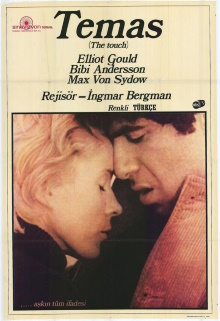This was Ingmar Bergman’s first English-language film, or at least many parts of it are in English anyway, and he also called it the first love story film he ever made. Unlike the rest of the director’s filmography, this one has very low ratings and it left me frustrated with its abrupt ending and deliberate ambiguity. Nonetheless it is a very visceral depiction of raw passion and it’s loaded with references to religious imagery to grant it some deeper meaning. It may not be Bergman’s best work but I think it deserves a better reputation than what it currently has.
Housewife Karin grieves after the death of her mother in the hospital and is seen doing so by a man she doesn’t know. Some time later they meet again when her husband, Andreas, who is a doctor at the same hospital invites that man to dinner at their house. He is a David, an American archaeologist in town to work on their medieval church where a 500-year old statue of the Virgin Mary has been found. During a quiet moment, David confesses to Karin that he had fallen in love with her the first time he saw her crying in the hospital. Despite having a perfectly comfortable home life with Andreas and two children, Karin seems to appreciate being desired and excited at the thought of having an affair for the first time. She goes to David’s dingy rented apartment to have sex, and though the initial encounter doesn’t go well, they commence to see each other regularly. David turns out to be moody, demanding and even hits her on one occasion. Yet this only seems to make Karin more attached to him until their affair is exposed.
This is an especially ugly and unflinching depiction of an extramarital affair and Bergman goes to great lengths to show just how sordid it is. This was shot on the island of Gotland in Sweden and so opens with some beautiful establishing shots of the scenery around Karin’s home. Inside her house, everything is similarly perfect and in order with her only grievance being the familiar one that Andreas is often busy with his work at the hospital. By contrast David is scruffy, crude and temperamental. The apartment they have their trysts at is a dump by their own admission. So the central question of this film is just why would a seemingly happy housewife with everything she could possibly want be willing to give up everything for David. The Biblical themes of temptation are fairly overt but more pertinent in my opinion is that David catches Karin during a moment of vulnerability as she grieves. She in turn feels drawn towards David who is a very tortured person and seems as much in need of a motherly figure as a lover. The imagery of the statue of the Virgin Mary in the church recurs again and again for this reason I believe.
I know Bergman likes to be ambiguous and leave things open, but it’s especially frustrating here. Karin isn’t the introspective type to let us into her head so that we can understand her internal justifications for her decisions. She’s embarrassed when her daughter glares at her in disapproval but she continues with the affair without explaining anything. We get some idea of why David is a tortured soul from what he says about his family being victims of the Holocaust but the film never returns to the subject. In Bergman’s view, humans simply aren’t rational machines and are instead driven by complex motivations and passions that are inexplicable. This makes the film excel at capturing the need and mutual dependence but it doesn’t satisfy me at all as I want to know why.
I still think this is underrated by critics. Bergman takes great care with the cinematography, matching the details of the environment with every scene and brings out excellent performances from the actors. Compared with the director’s better known works, this is noticeably less complex and perhaps less intellectual. Yet even a subpar film by Bergman is superb by the standards of other directors and I think this is well worth watching even if it will never be one of my favorites.
